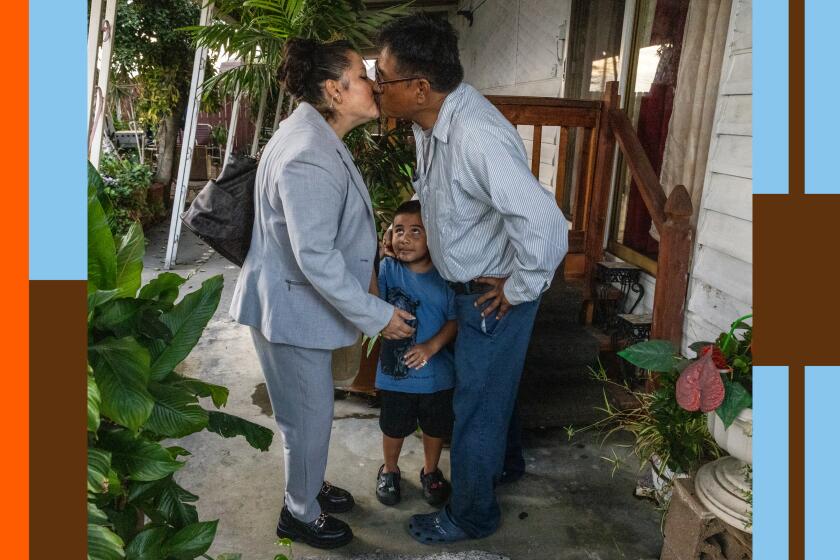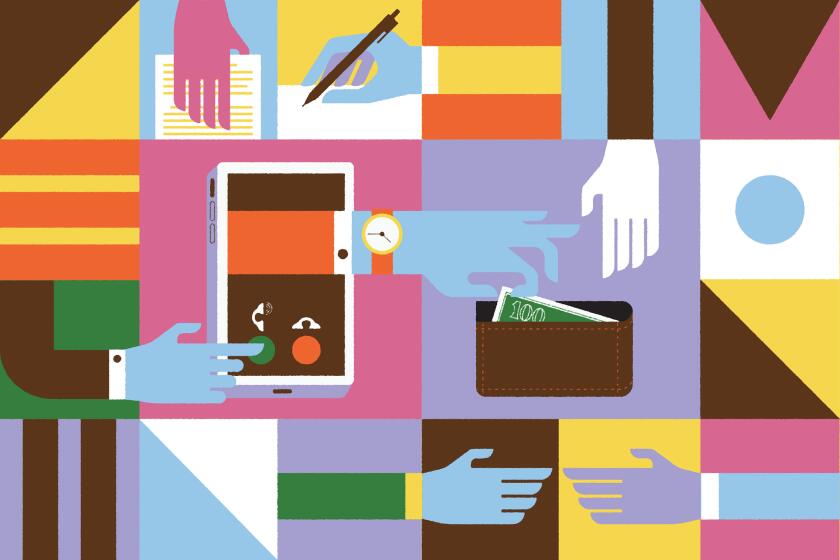
- Share via
Becoming a U.S. citizen or legal permanent resident can be daunting for immigrants, considering the lengthy backlogs they encounter and hoops they have to jump through. One hoop has caused particular anxiety in recent years — the “public charge” determination.
Government officials make a public charge assessment to determine whether a person is likely to become “primarily dependent” on government aid programs in the future. If U.S. Citizenship and Immigration Services officials identify a person as a public charge, they will be deemed inadmissible into the United States. A person already here can be blocked from getting a green card or citizenship.
Drawing on an unprecedented poll, this series tells the stories of immigrant life in America today, putting their voices in the foreground.
The policy has been on the books for a long time. It applies to only a fraction of the people seeking to enter the country or change their status. But changes in how the rule was applied during the last few years caused confusion that continues to hover over immigrant communities.
Immigration officials do not consider food, housing and healthcare programs when deciding whether someone is a public charge.
But some immigrants have been so concerned about being deemed public charges, they’ve avoided even assistance programs that are not part of the determination, said Adriana Cadena, director of Protecting Immigrant Families, a coalition of immigrant advocates.
Eight percent of immigrants nationwide — and 12% in California — said they had avoided applying for government food, housing or healthcare programs in the last year because of concern about drawing attention to their immigration status or the status of someone in their family, according to a nationwide survey of immigrants conducted by The Times in partnership with the nonprofit KFF, formerly known as the Kaiser Family Foundation.
Immigrants to the U.S. face extensive challenges, but they still report high levels of optimism about their futures and trust in American institutions, a comprehensive survey has found.
The survey also revealed widespread uncertainty among immigrants about how applying for benefits might affect a person’s chances of getting a green card, which allows permanent residence in the U.S., or applying for citizenship.
Nationwide and in California, 1 in 6 immigrants said they believed that using government programs that help pay for healthcare, housing or food would decrease an immigrant’s chances for a green card, which is not accurate. Just 1 in 4 correctly said that using such benefits would not hurt a person’s chances, while nearly 6 in 10 said they were unsure.
The survey also found that 45% of immigrants nationwide said they did not have enough information to understand how U.S. immigration policies affect them and their families.
The Times/KFF survey of American immigrants polled 3,358 immigrants nationwide, including 905 in California between April 10 and June 12. The margin of error for the full sample is 2 percentage points in either direction.
Here’s how much of the confusion about public charge rules arose, what the rules are now and to whom the rules apply.

Why is the public charge rule confusing?
In 1999, immigration officials published a set of rules on the public charge determination called the Field Guidance. Those guidelines identified two forms of government aid as signs that a person was or would be a financial burden: cash benefits and long-term institutional care.
But in 2019, the Trump administration published a new rule that expanded the list of programs officials could look at, adding Medicaid, food stamps, housing vouchers, nutritional programs and numerous other forms of public assistance.
The new rule was not in effect for long. Court challenges blocked the administration from using it except for a brief period, and President Biden formally dropped it a few months after he took office in 2021. Nevertheless, confusion about the rule lingers, leaving many immigrants apprehensive about using benefit programs that are available to them.
For several years, Oswaldo Rafael Cabrera touted his services as an immigration attorney in advertisements, social media posts and interviews with Spanish-language news outlets.
Immigration advocates, including Cadena and Jeremy McKinney of the American Immigration Council, said even though the Trump-era rule was in effect for less than a year, it had a chilling affect.
“Research and anecdotal evidence showed us that the public charge regulation caused such fear among immigrants who sought to legally apply for a green card that many chose to forego healthcare and vital economic support,” McKinney said.

What is the public charge rule now?
Under the Biden administration, the decision about whether a person is a public charge has returned to the standards set by the 1999 Field Guidance with some additional clarifications for families.
What’s considered: The Biden policy bases the determination on whether an immigrant is receiving or is likely to receive long-term institutionalized care (such as in a nursing home) at the government’s expense or monthly cash support (including Supplemental Security Income, Temporary Assistance for Needy Families, or cash assistance programs from state or local governments).
What’s not considered: Programs that assist with healthcare (including health insurance subsidies offered by the Affordable Care Act), nutrition, housing, education and childcare, disaster relief and other public benefits, including transportation vouchers, job training programs, soup kitchens, crisis counseling and intervention, and energy assistance. Nor are earned benefits, such as unemployment benefits or Earned Income Tax Credit refunds, factored into the determination.
The Biden administration’s rule further clarified that if a family member who isn’t the applicant uses public assistance programs, that will not have an impact on the public charge assessment.
For example, if a person applies for a green card and her children use Medi-Cal, nutritional programs (free school meal programs, for example) or cash assistance, that’s OK.
Despite the changes, Cadena said Protecting Immigrant Families continued to see clients fearful of accepting any kind of governmental help during the pandemic.
In 2021, her group surveyed 1,000 Americans in mixed-status immigrant families to better understand what they knew about the public charge update. The organization found that nearly half of families who needed help during the COVID-19 pandemic abstained from applying for assistance due to concerns over immigration status.
That same year, Biden issued an executive order instructing immigration officers nationwide not to consider vaccines or public benefits related to the pandemic in a public charge determination.
In its written guidance about the rules, Citizenship and Immigration Services says that “we encourage everyone, including noncitizens, to seek necessary medical care, including treatment or preventive services for COVID-19.” The agency applies the same guidance to other pandemic-related benefits and services (including food assistance and housing programs).
Outside of the pandemic, most immigrants in California can get healthcare and short-term rehabilitative services from Medi-Cal and home- and community-based services (including In-Home Supportive Services), according to the Health Consumer Alliance.

Who is subject to a public charge determination?
Only a portion of the people seeking to enter the country or change their status face a public charge determination.
The standard applies to people seeking a green card for the first time (through a relationship to a U.S. citizen or a sponsorship by a U.S. employer) and lawful permanent residents seeking to reenter the U.S. after an absence of more than six months.
Lawful permanent residents with green cards do not go through a public charge determination when they apply for U.S. citizenship or green card renewals, according to the California Department of Social Services.
The assessment also doesn’t apply to:
- Immigrants granted asylum in the U.S.
- Refugees
- Abused, abandoned or neglected immigrants under age 21 granted court protection as Special Immigrant Juveniles
- Petitioners for permanent resident status under the Violence Against Women Act
- Survivors of serious crimes (U visa applicants or holders)
- Survivors of human trafficking (T visa applicants or holders)
If you’re still unsure whether a program could hinder your ability to change your immigration status, the Keep Your Benefits guide created by the Legal Aid Society of San Mateo County can help you understand your options.
The Immigrant Legal Resource Center also offers a list of the benefit programs that are safe to use.
You can also seek in-person help by visiting a legal or nonprofit organization in your area. The California Department of Social Services has a list online of organizations that can help answer your questions.
More to Read
Sign up for Essential California
The most important California stories and recommendations in your inbox every morning.
You may occasionally receive promotional content from the Los Angeles Times.

















